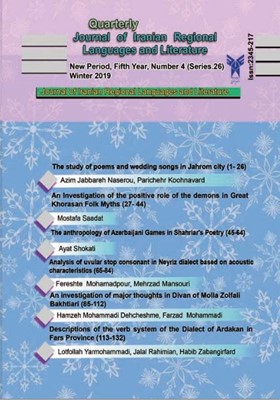-
-
List of Articles
-
Open Access Article
1 - The study of poems and wedding songs in Jahrom city
Azim Jabbareh Naserou Parichehr Koohnavard -
Open Access Article
2 - شناسنامه علمی
-
Open Access Article
3 - An Investigation of the positive role of the demons in Great Khorasan Folk Myths
Mostafa Saadat -
Open Access Article
4 - The anthropology of Azerbaijani Games in Shahriar's Poetry
Ayat Shokati -
Open Access Article
5 - Analysis of uvular stop consonant in Neyriz dialect based on acoustic characteristics
Fereshte Mohamadpour Mehrzad Mansouri -
Open Access Article
6 - An investigation of major thoughts in Divan of Molla Zolfali Bakhtiari
Hamzeh Mohammadi Dehcheshme Farzad Mohammadi -
Open Access Article
7 - Descriptions of the verb system of the Dialect of Ardakan in Fars Province
Lotfollah Yarmohammadi Jalal Rahimian Habib Zabangirfard
-
The rights to this website are owned by the Raimag Press Management System.
Copyright © 2021-2025







